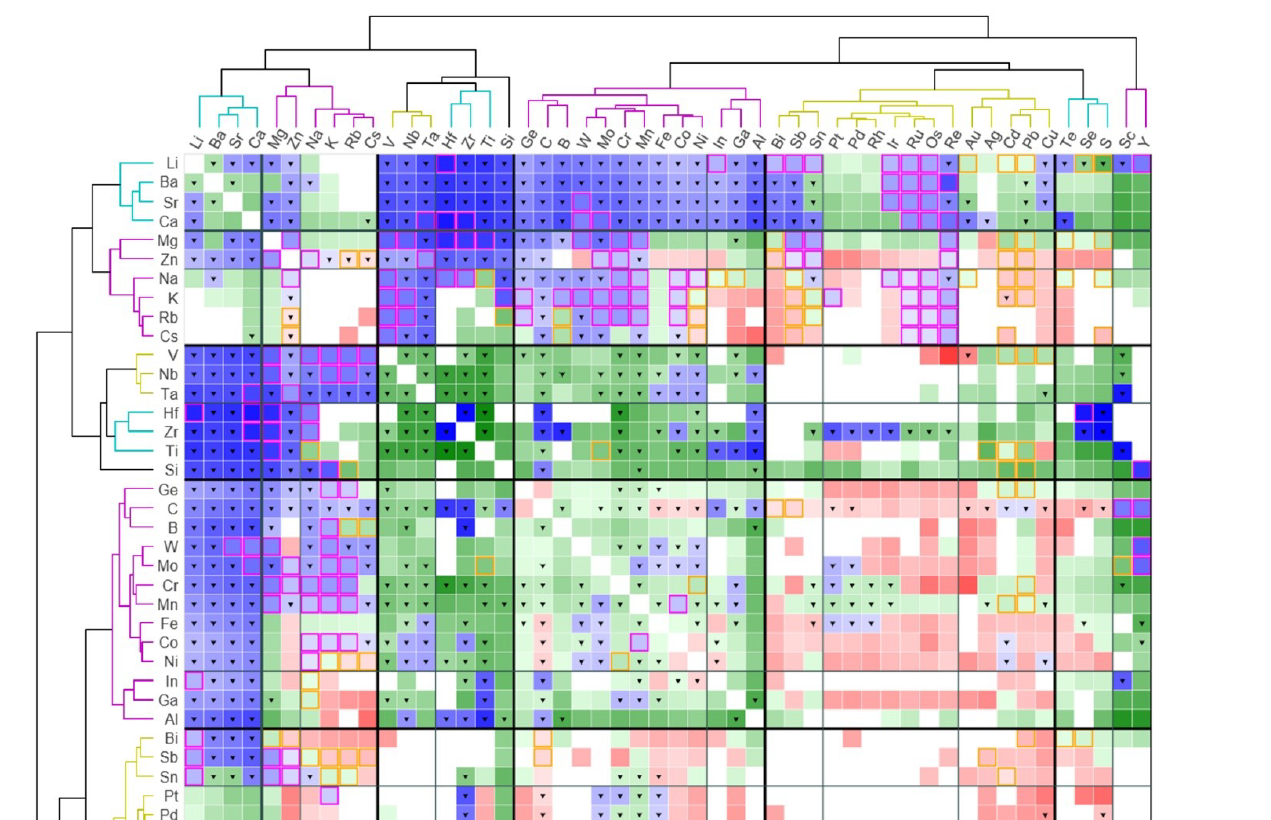
Predicting Synthesis and Synthesizability
Our research group is interested in resolving outstanding fundamental scientific problems that impede the computational materials design process. Our immediate goal is to develop a more quantitative understanding of materials synthesis-structure relationships; specifically, to elucidate and predict crystallization pathways through metastable phases during materials formation. Our work involves developing new thermodynamic frameworks and density functional theory (DFT)-based tools to investigate phase equilibria at the nanoscale, competitive nucleation, and constrained equilibria. We also use data-mining techniques to design new technological materials, and to map relationships across the structural and thermodynamic landscape of known materials.
Our primary research focus is on developing new quantitative and predictive theories of inorganic materials synthesis. This effort was born out of a realization that the computational materials discovery pipeline is no longer bottlenecked by the identification of promising new materials, but rather, by the difficulty of synthesizing predicted compounds in the laboratory. The ability to predict how materials form, and under which conditions, is the final step required to ‘close-the-loop’ in the computational materials discovery and design process.
Targeted Synthesis
DFT is often used to predict novel materials with exciting properties. However, even when DFT can predict what compounds to make, how do we synthesize these newly predicted materials in a lab? Developing a predictive theory of materials synthesis requires a better understanding of metastable phases—which often appear as kinetic byproducts during materials formation. We derive theoretical frameworks to predict non-equilibrium crystallization pathways, helping chemists to navigate through the thermodynamic and kinetic energy landscape towards the synthesis of novel target materials.
Exploratory Synthesis
In the modern age of data science, there is more catalogued and query-able materials data than ever before. We employ high-throughput computational materials discovery techniques to survey uncharted chemical spaces for novel synthesizable materials, constructing large stability maps to help guide exploratory synthesis. Using data-mining and machine-learning algorithms, we aim to explain the complex interplay between chemistry, composition, and electronic structure in governing large-scale stability trends across broad materials spaces.
Nucleation and Growth
Crystallization from a supersaturated solution frequently proceeds through a series of transient, metastable phases prior to the formation of the lowest-energy, stable polymorph. This phenomenon, popularly referred to as “Ostwald’s Rule of Stages”, occurs in all classes of materials, from inorganic minerals and functional technological materials to organic crystals and biological protein crystals. Despite there being a lower thermodynamic driving force for the formation of a metastable polymorph, a metastable phase can still dominate the kinetics of crystallization if it has a lower nucleation barrier than the equilibrium phase. Our group aims to unify classical thermodynamics, nucleation, diffusion, and crystal growth theories to predict the Temperature-Time-Transformation (TTT) transformation pathways for compounds during materials synthesis.
News
-
Our Nature Physics article on quasicrystals is featured in Wired magazine and Quanta Magazine!
https://www.wired.com/story/quasicrystals-spill-secrets-of-their-formation
https://www.quantamagazine.org/quasicrystals-spill-secrets-of-their-formation-20250818/
-
Emily Oliphant successfully defends her PhD research titled, "Bridging Bonds and Bands: A Toolkit for Interpreting the Crystal Chemistry of Electronic Structure". Congratulations!
-
Woohyeon Baek, Shibo Tan, and Wenhao Sun publish their paper “Quasicrystal stability and nucleation kinetics from density functional theory” in Nature Physics! Read the Michigan Engineering Newsand Nature Physics News articles.
-
Joonsoo Kim successfully defends his PhD research titled, "Thermodynamic and Kinetic Analysis of Crystal Growth in Unconventional Supersaturated Solutions". Congratulations!
-
Emily Oliphant and Wenhao Sun publish their paper “Why does silicon have an indirect bandgap?” in Materials Horizons! Read it here: https://doi.org/10.1039/D4MH01038H
-
Wenhao Sun and Nicholas David publish “A critical reflection on attempts to machine-learn materials synthesis insights from text-mined literature recipes” in Faraday Discussions. Read about it here: https://doi.org/10.1039/D4FD00112E
-
Jiadong successfully defends his PhD research titled, "Exploring Inorganic Materials Synthesis Prediction with High Dimensional Phase Diagrams". Congratulations!
-
Jiadong Chen publishes his work “Navigating phase diagram complexity to guide robotic inorganic materials synthesis” in Nature Synthesis! Read the Michigan Engineering News and Science press-release.
-
Joonsoo Kim wins the 2024 Spring MRS Gold Medal for his outstanding Dolomite research. Congratulations! Read the department press-release here.
-
Nick wins the National Science Foundation’s Graduate Research Fellowship. Congratulations! Read the department press-release here.
-
Joonsoo Kim’s paper, “Dissoluton enables dolomite crystal growth near ambient conditions” is published as the front cover of the Nov 2023 issue of Science. Read it here.
-
Professor Sun is awarded an endowed Assistant Professor chair position by the Dow Corning company. The position is awarded to one assistant professor in the UM College of Engineering once every three years.
-
Professor Sun’s proposal Machine-Learning Classification of Materials Synthesizability was successfully funded!
-
Professor Sun delivers a talk, “Unsupervised machine-learning in ‘big’ materials data” to the Machine-Learning section of the Gordon Research Conference!
-
Congratulations! Taorui will be doing a PhD in Materials Science and Engineering at University of Wisconsin Madison; Anirudh will be joining Intel as a materials engineer, and Chao Feng will be joining Huawei as a materials engineer.
-
Daniel Evans and Jiadong Chen publish ‘Visualizing Temperatuire-Dependent Phase Stability in High Entropy Alloys’ in npj Computational Materials. Collaboration with Prof. Geoffroy Hautier from Dartmouth. Congratulations!
-
Our Advanced Materials paper titled, ‘Observing and Modeling the Sequential Pairwise Reactions that Drive Solid-State Ceramic Synthesis’ is highlighted in Nature Reviews Materials.
Check out the in situ TEM video of YBCO formation!
-
Brendan Casey Miles and Peter Son-Bell graduate UM with Masters Degrees. Daniel Evans graduates with a Bachelors in MSE, and will attend UC Berkeley as a PhD student. Congratulations!
-
Jiadong Chen wins $10,000 fellowship for the prestigious Rackham International Students Fellowship. Congratulations!
-
Joonsoo Kim will be funded on the ACS PRF Award, $110,000 for 2 years, titled, “Ab initio investigation of the crystal growth kinetics and mineral carbonation thermodynamics of Dolomite, CaMg(CO3)2.”
-
Wenhao Sun wins the Department of Energy Early Career Award, which provides $750,000 over 5 years for the Sun Group to study, “Temperature-Time-Transformation (TTT) Diagrams for Predictive Solid-State Ceramic Synthesis.”
-
Wenhao Sun named an Emerging Investigator in Materials Horizons for metathesis study on MgCr2S4 synthesis. Full interview here.



